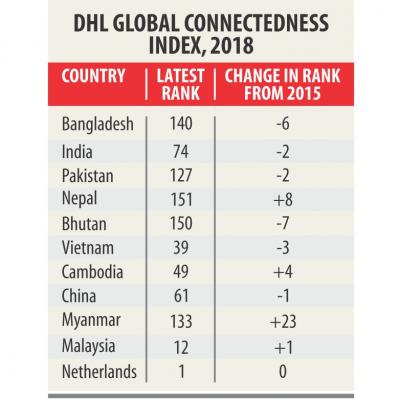Bangladesh slips 6 notches to 140th

Bangladesh slipped six spots to 140th among 169 countries in a ranking of the world's most connected nations brought out by global logistics company DHL.
The Global Connectedness Index 2018, the fifth since it was first released in 2011, was measured by four pillars: international flows of trade, capital, information and people.
Bangladesh's overall ranking fell from the 2015 edition although it improved its position in trade, capital and information pillars, said the report, which was released on Tuesday.
It ranked Bangladesh lower than its peer countries. India ranked 74th, Pakistan 127th, Vietnam 39th and Cambodia 49th. Myanmar is seven notches ahead of Bangladesh. In South Asia, only Afghanistan (167), Bhutan (150) and Nepal (151) were ranked lower than Bangladesh.
The top 10 countries ranked by their shares of Bangladesh's international flows are: India (25 percent), the UAE (14 percent), Saudi Arabia (7 percent), Malaysia (7 percent), the UK (5 percent), Russia (5 percent), Qatar (5 percent), the US (4 percent), Singapore (4 percent), and China (4 percent).
According to the report, the Netherlands is the world's most globally connected country and Europe is the world's most globally connected region, with 8 of the 10 most connected countries. Europe leads on trade and people flows, while North America is the top region for information and capital flows.
The index measures the parameters on depth and breadth. Depth evaluates the extent to which countries' international flows are distributed globally or more narrowly focused, while breadth compares countries' international flows to the sizes of their domestic economies.
On the depth dimension, the lowest ranked countries are Ethiopia, Bangladesh, Sudan, Pakistan, Cameroon, Iran, India, Tanzania, Afghanistan, and Indonesia, while the top ranks are held by Singapore, Hong Kong SAR (China), Belgium, the Netherlands, Luxembourg, the United Arab Emirates, Seychelles, Ireland, Estonia, and Cyprus.
On breadth dimension, Bangladesh scored well securing 66th position out of the 169 countries.
The report presents the first comprehensive assessment of how globalisation—measured based on trade, capital, information, and people flows—has developed since the Brexit referendum in the UK and the election of President Donald Trump in the US.
Contrary to predictions that globalisation would collapse in response to a wave of economic nationalism, the DHL Global Connectedness Index rose to a record high in 2017. For the first time since 2007, trade, capital, information, and people flows all intensified significantly. Strong economic growth boosted international flows while key policy changes such as US tariff increases had not yet been implemented.
In 2018, however, major policy threats turned from rhetoric to reality. Disputes between the US and its largest trade partners prompted sharp tariff increases and raised doubts about the future of the global trading system.
Foreign acquisitions were subjected to heightened scrutiny, countries advanced data localisation policies, and restrictions on immigration were tightened.
Supporters of open markets, nonetheless, also tallied major victories in 2018. In March, 11 countries signed the Comprehensive and Progressive Agreement for Trans-Pacific Partnership and 44 signed the African Continental Free Trade Agreement.
In July, the European Union and Japan finalised an Economic Partnership Agreement. In October, the US, Canada, and Mexico agreed on a new trilateral trade deal. Meanwhile, China continued to advance its Belt and Road Initiative aimed at strengthening linkages between Asia, Europe and Africa.
